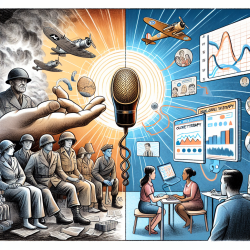Unveiling Hidden Lessons from WWII: How Speech Pathologists Can Learn from History
As a speech-language pathologist, the pursuit of improving outcomes for children is a relentless journey. While our primary focus is often on modern research and techniques, history can sometimes offer surprising insights. One such historical account is detailed in "The Battle of the Atlantic and American Preparations for World War II in Northern Ireland, 1940-1941 (before Pearl Harbor)" by Hedley-Whyte and Milamed. This paper, although centered on military strategies and public health during wartime, provides valuable lessons that can be applied to our field.
Data-Driven Decisions: A Historical Perspective
The research highlights the importance of data collection and analysis in decision-making processes during WWII. The U.S. Military's emphasis on gathering medical intelligence and preventive measures underlines the critical role of data in crafting effective strategies. As practitioners, we can draw parallels to our own field by recognizing the significance of data-driven decisions in therapy planning and execution.
Incorporating systematic data collection into our practice allows us to:
- Identify patterns and trends in a child's progress.
- Adjust interventions based on empirical evidence.
- Ensure accountability and transparency in therapeutic outcomes.
Collaboration and Multidisciplinary Approaches
The paper also emphasizes the collaborative efforts between the U.S. and U.K. during the war, particularly in the realm of public health. This collaboration led to the establishment of the American Red Cross-Harvard Field Hospital Unit, which played a pivotal role in preventive medicine. In our field, collaboration with other professionals such as educators, psychologists, and occupational therapists can enhance the effectiveness of our interventions.
By fostering a multidisciplinary approach, we can:
- Gain diverse perspectives on a child's needs.
- Develop comprehensive and holistic intervention plans.
- Leverage the expertise of various professionals to optimize child outcomes.
Encouraging Further Research
While the historical context of the paper may seem distant from our current practice, it serves as a reminder of the value of continuous learning and research. Just as the military adapted and evolved its strategies based on new data and insights, we too must remain open to new research and methodologies in speech-language pathology.
To further enhance our practice, consider:
- Engaging in professional development opportunities.
- Staying updated with the latest research in the field.
- Conducting your own research to contribute to the body of knowledge.
By embracing these lessons from history, we can refine our practice and ultimately improve outcomes for the children we serve.
To read the original research paper, please follow this link: The Battle of the Atlantic and American Preparations for World War II in Northern Ireland, 1940-1941 (before Pearl Harbor).










